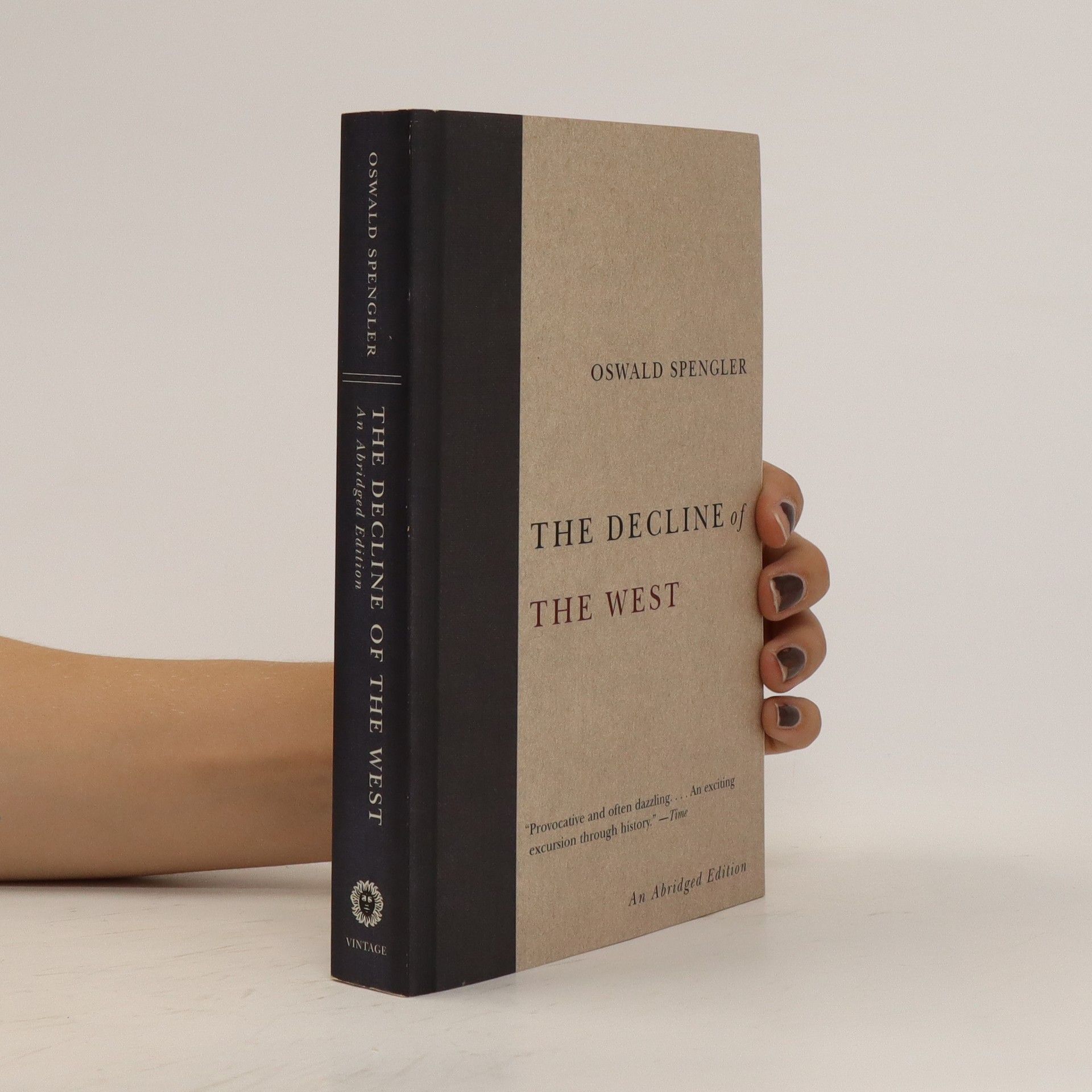Exploring the theme of cultural morphology, this volume delves into the historical dynamics of societies and the rise of "Caesarism," a concept that links dictatorship to mass democracy. Spengler argues that the previous calm has given way to more controversial and optimistic interpretations of history, challenging readers to reconsider the cyclical nature of cultural development. His analysis offers a unique perspective on the interplay between democracy and authoritarianism throughout history.
Oswald Spengler Book order (chronological)
Oswald Spengler is renowned for his sweeping philosophy of history, which seeks to uncover the cyclical nature of civilizations. He posits that each culture undergoes predictable phases of growth, maturity, and decline, akin to a living organism. His work, drawing on profound insights from history, art, and science, offers a stark vision of the inevitable end of Western civilization. Spengler's urgent perspective and his conviction in cultural cycles continue to provoke widespread discussion.







Myšlenky
- 226 pages
- 8 hours of reading
Pilíř, o nějž se lze opřít v otřásajících se časech zániku Západu a jeho přeměny ve světovou civilizaci všech kultů a ras. Kniha obsahuje: vedle 370 výroků o pojmech, majících ve Spenglerově myšlení zásadní význam, jako např. osobnost, dějiny, válka, právo, stát, tradice atd., vpůvodním výboru správkyně autorovy – do té doby z valné části nezveřejněné – pozůstalosti, též rozsáhlý překladatelský a redakční výběr z knih Preussentum und Sozialismus a Jahre der Entscheidung s aktuálními poznámkami a vysvětlivkami, jakož i úplnou, komentovanou bibliografii nakladatelství Délský Potápěč.
Oswald Spengler presents a stark critique of modern Western civilization, delving into its cultural and historical decline. Through his analysis, he explores the philosophical underpinnings and societal shifts that have led to this perceived deterioration. Spengler's work challenges readers to confront the realities of their civilization's trajectory, offering a thought-provoking perspective on its future.
Die Sammlung umfasst eine Vielzahl von Reden und Aufsätzen von Oswald Spengler, die sich mit Themen wie Pessimismus, dem deutschen Volkscharakter und der Entwicklung der deutschen Presse beschäftigen. Dabei werden auch historische und kulturelle Fragestellungen behandelt, etwa zur Bedeutung des Streitwagens in der Weltgeschichte und den amerikanischen Kulturen. Die Berliner Ausgabe von 2022 bietet einen durchgesehenen Neusatz in lesefreundlichem Großdruck und ist in einem ansprechenden Großformat gestaltet. Die Texte basieren auf der Originalausgabe von 1937.
The book explores humanity's ancient past through a lens of conflict and transformation, depicting the rise and fall of civilizations as savage tribes clash with advanced societies. It details the overthrow of kings by emperors, peasant revolts, and the shifting dynamics of power across diverse landscapes. Key events include the siege of Troy and the emergence of a new cultural order influenced by the advent of Christ, highlighting the transition from paganism to modern universalism and the inevitable decline of once-dominant nations.
Die Erzählung vermittelt eine melancholische Atmosphäre, in der die Natur in der Dämmerung zum Stillstand kommt. Die schließenden Blumen symbolisieren eine unheimliche, rätselhafte Angst vor der Vergänglichkeit des Lebens. Während der Wald und die Wiesen in Stille verharren, bleibt nur die kleine Mücke frei und ungebunden, die im Abendlicht ihren eigenen Weg tanzt. Diese Kontraste zwischen Stille und Freiheit reflektieren tiefere Themen des Daseins und der Verbindung zur Erde.
Die Untersuchung der historischen Menschheit steht im Mittelpunkt dieses Werkes, das die Frage aufwirft, ob es eine übergeordnete Logik hinter den Ereignissen der Geschichte gibt. Es wird erörtert, ob eine metaphysische Struktur existiert, die unabhängig von den sichtbaren, populären geistig-politischen Strömungen ist und diese erst hervorbringt. Der Autor lädt den Leser ein, die großen Züge der Weltgeschichte aus einer neuen Perspektive zu betrachten und mögliche Schlüsse zu ziehen, die über das Zufällige hinausgehen.
Die zweite Ausgabe untersucht die Frage nach einer übergeordneten Logik in der Geschichte und ob es eine metaphysische Struktur gibt, die unabhängig von den zufälligen Einzelereignissen existiert. Der Autor regt zum Nachdenken an, ob die großen Strukturen der Weltgeschichte möglicherweise immer wieder in erkennbaren Mustern erscheinen, die tiefere Einsichten und Schlussfolgerungen zulassen. Diese philosophischen Überlegungen laden dazu ein, die Zusammenhänge und Entwicklungen der Menschheit aus einer neuen Perspektive zu betrachten.
Pesimismus? : a další úvahy
- 88 pages
- 4 hours of reading
Soubor pěti kratších úvah představuje německého filosofa Oswalda Spenglera, známého svou objemnou a provokativní koncepcí dějin, nejen jako polemika, ale také jako osobnost s širokým rejstříkem znalostí a zájmů.Titul je nazván podle první úvahy, v níž se Spengler vyrovnává s nařčením, že jeho chápání dějin je pesimistické. Další stať výboru zachycuje Spenglerovo srovnávání dvou myslitelů, kteří se stali jeho trvalou inspirací. Jsou jimi Nietzsche a Goethe. Spenglerovo pozoruhodné hledání dějinných analogií předvádí úvaha Stáří amerických kultur a jeho mnohdy překvapivé důrazy na určité dějinné souvislosti ilustruje pojednání Bojový vůz a jeho význam pro průběh světových dějin. Výbor uzavírá poměrně krátká, za to však výstižná odpověď na otázku Je možný světový mír?, jejíž formulace je z roku 1936, tedy z roku, v němž se uzavřela Spenglerova životní pouť.
Exploring the decline of Western civilization, the book presents this phenomenon as a profound philosophical issue rather than a mere historical event. It delves into the implications of this decline, linking it to fundamental questions of existence and being. Through this lens, the author invites readers to reflect on the broader significance of cultural decline, suggesting that it encompasses essential inquiries that shape human understanding and experience.

